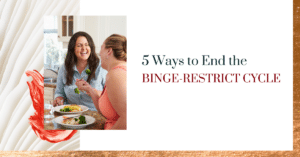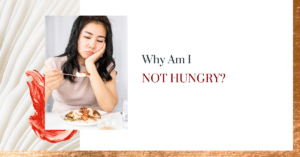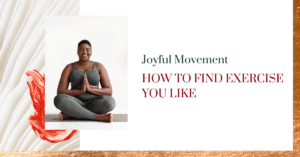24 Benefits of Intuitive Eating

Food freedom and a better relationship with food are two of the benefits of intuitive eating…but what do those things mean exactly? Read on for 24 (relatable!) intuitive eating benefits that you can see as you move through this process.

Unlike dieting, learning how to eat intuitively is not measured by pounds lost or inches shed (in fact, weighing yourself can hinder the intuitive eating process – more on that here). When you first start your intuitive eating journey, it can feel like a slow and scary process.
But over time, you’ll start noticing a lot of changes happening in varying areas of your life. Although food freedom and a better relationship with food are one of the benefits of intuitive eating, you will also see tremendous benefits in your physical, mental, emotional health, and spiritual health.
There are over 100 research studies looking at intuitive eating and intuitive eating has been shown to have many health outcomes, including:
- Improved cholesterol levels
- Better body image
- Higher self-esteem
- Improved metabolism
- Decreased rates of disordered and emotional eating
- Diminished stress levels
- Increased satisfaction with life
These mental and physical health benefits are fantastic and it’s so exciting to see intuitive eating be studied so frequently. But when you’re in the midst of the intuitive eating process, and are working to come to terms with your relationship to food and your body, it can be hard to relate to these science-y benefits.
So I decided to put together a different kind of list of intuitive eating benefits – one that you may be able to relate to more easily.
All of these benefits are ones that have come straight from our actual clients.
Benefits of Intuitive Eating
1. You can detect – and honor – hunger cues. You are able to notice when your body feels hunger, and honor that hunger by feeding it. Even if it’s late at night, or it’s “only” been X hours since your last meal, or if you think you already ate enough today – you trust your body when it tells you it’s hungry.
2. You know what foods you like and dislike. Now that you’re not eating based on external signals, you are able to explore food and figure out what you like and don’t like. Often times, you’ll find that some of the “forbidden” foods you might have binged on in the past, you realize you don’t even like. Alternatively, you have the freedom to explore foods without the “good” and “bad” chains, which often means you’ll find a whole bunch of foods or recipes that you never knew you could love.
3. You have less guilty thoughts surrounding food. You are able to shut down your inner food police and can enjoy a variety of foods without feelings of judgment or guilt.
4. Food no longer is a moral issue. Labels like “good” and “bad” fade away. You don’t categorize food anymore and are able to remove yourself from the guilt you once associated with certain foods. You no longer feel like you’ve been “good” or “bad” related to your food choices and you know that you are worthy no matter what you eat.
5. Food tastes better. When you get rid of the guilt and anxiety surrounding food, there is more room for taste. You are able to be more present and pay attention to the taste, the texture, and smell, which leads to more enjoyment.
6. You are able to notice how certain foods make you feel. You have developed a much better relationship with food and can detect your fullness and satiety cues. You know which foods make you feel good and energized and you know which foods don’t.
7. You have more energy. As you become more in tune with your body you’re able to recognize what foods make you feel your best. You find that you have more energy consistently throughout the day and you figure out which foods help your energy levels and which ones don’t.
8. You don’t get cravings as often. When you start to re-establish trust with your body and honor your hunger and fullness cues, your cravings will become less frequent.
9. Your self-confidence increases. You’ve stripped away the guilt you once attached to eating certain foods and have learned to trust your body. You know that what you eat does not define you. Your overall self-confidence increases as you learn to trust yourself and live an unapologetic life. You don’t feel like you owe anyone else your health or your body.
10. Your relationships with friends and family improve. When you no longer have so much stress and anxiety surrounding food, you free up space to just be and enjoy the food – and the people – around you. You can engage in social interactions more often and can put your attention on spending time with friends and family, rather than worrying about your diet.
11. You are more flexible. Your thinking is no longer “all or nothing” and you have more brain space to be flexible, and changes – like spontaneous dinner plans or a restaurant that is closed – don’t throw off your entire day.
12. You develop a better relationship with exercise and actually enjoy it. You see exercise as a form of self-care and no longer as a means to burn off a certain number of calories. You embrace intuitive movement and only do the exercise you enjoy. You don’t feel guilty when you take a rest day.
13. You are able to keep “trigger” foods around your house. You buy food you love at the grocery store and store it once you get home and don’t give it any more thought. You eat it when you feel like it and sometimes you might even forget it’s there.
14. You can leave leftovers on your plate. You can detect when you are full and do not feel obliged to always finish everything on your plate.
15. You approach things with curiosity instead of judgment. Using curiosity allows you to take a step back and gain perspective. You can be thoughtful and reflective and find the grey area, instead of utilizing black and white thinking. You can learn from your actions, instead of beating yourself up for them.
16. You have more time on your hands. Now that you’re not preoccupied with thoughts of food, you have more headspace and time to do other things. You can explore other hobbies and ways of filling your time.
17. You try things you’ve never tried before. This could be different foods, different cuisines or different activities. Your increase in self-confidence allows you to open up your world and do things you wouldn’t have done before. For example, you are able to go out to dinner without having to scan the menu beforehand or you are able to throw on a swimsuit and not think twice about what others may think.
18. You are nicer to yourself. You learn self-compassion skills and begin to treat yourself as you would a friend or loved one. You are kind and understanding to yourself, and instead of beating yourself up, you think about ways you can comfort and care for yourself.
19. You find other coping mechanisms. You develop several tools to help manage stress and emotions. Food may be one of them, but it’s not the only coping tool in your arsenal. You are also able to emotionally eat, recognize why it is happening, and do it in a way that feels helpful and supportive.
20. Your overall mood improves. You don’t feel guilty eating foods you were once fearful of and you don’t let food affect your mood anymore. You know how to properly fuel your body and are able to discern what makes you feel good physically and mentally.
21. Your digestion improves. When you eat in a stressed state, your digestion can completely shut down. This can cause constipation and lead to a host of gastrointestinal related issues. But as your food anxiety and stress decreases, and you get to learn how certain foods affect your body, you may experience less gastrointestinal symptoms.
22. You eat more mindfully. You tune into your body’s hunger, satiety, and fullness cues and are able to take the time to decipher when you reach each state. You take your time eating and savor each bite.
23. You are more satisfied with life. You feel happier overall and are able to seek pleasure from things other than food. You are not constantly worried about what other people are thinking of you and can live your life unapologetically in a way that supports your wants and needs.
24. You develop a new sense of awareness. You are more mindful, not just when you eat, but in general, you are more present throughout the day. This can mean increased body awareness, better connection and conversations with others, and more.
What are some benefits you’ve noticed since you stopped dieting and started intuitive eating? Share with me in the comments below!
Are you interested in learning more about intuitive eating?
Check out my Unapologetic Eating 101 Course, an online, self-paced program to liberate yourself from dieting and make peace with food and your body.
My team and I also offer virtual one-on-one support – you can check out our virtual intuitive eating nutrition coaching packages.
My book, Unapologetic Eating: Make Peace with Food and Transform Your Life, is also a great resource that includes information, research, and reflection prompts to help you move away from dieting and come back home to your body, so you can live your most unapologetic, liberated life.
share the love

about
Alissa Rumsey, RD.
Alissa Rumsey, MS, RD, CDN, CSCS (pronouns she/her/hers) is a registered
dietitian, nutrition therapist, certified intuitive eating counselor, and the author of
Unapologetic Eating: Make Peace With Food and Transform Your Life. Alissa is
passionate about helping people reclaim the space to eat and live,
unapologetically.

A twice-a-month round-up of inspirational stories, lessons, practical tips and encouragement for living your most authentic, unapologetic life.
The Unapologetic Life
RECENT POSTS

The Unapologetic Life
A twice-a-month round-up of inspirational stories, lessons, practical tips and encouragement for living your most authentic, unapologetic life.










